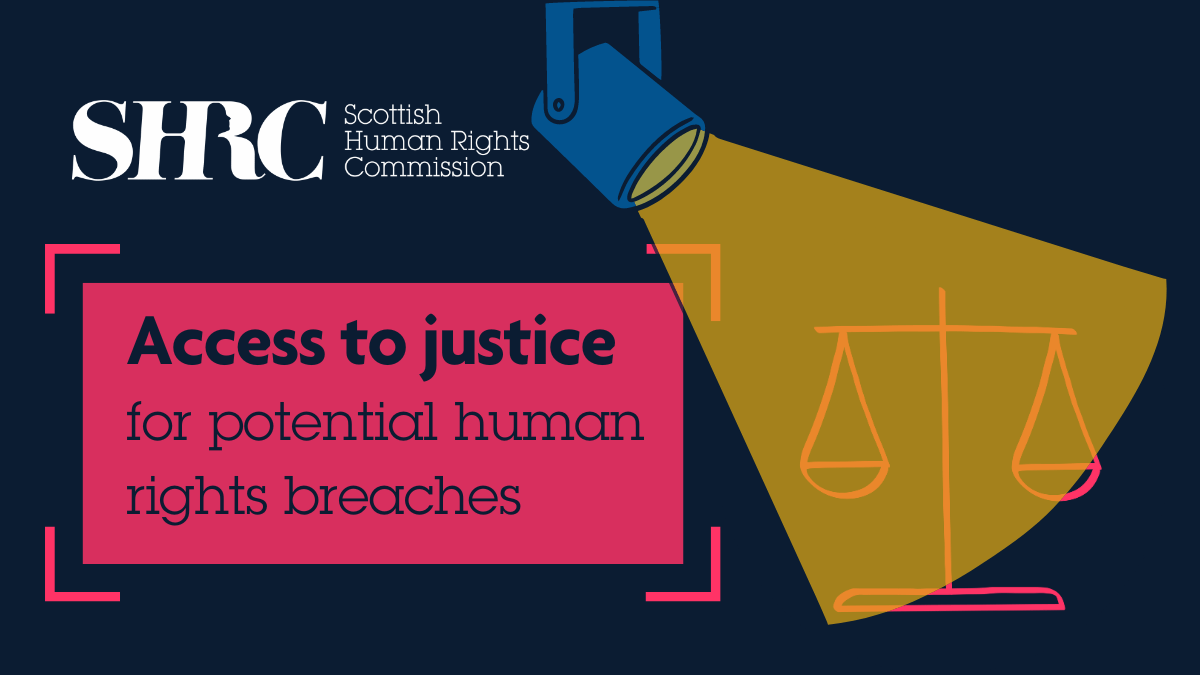Why we are spotlighting this issue
In Scotland, our human rights are protected by international and domestic law. These laws should help to prevent breaches of our rights and provide us with routes to access justice when things go wrong.
Yet too often, people in Scotland are experiencing human rights denials and facing barriers that prevent them from accessing justice.
The journey to access justice for human rights breaches can be long, complicated, and expensive, requiring rights holders to have:
- knowledge about where to turn for help or how to complain
- money for and access to specialist legal advice
- time and emotional resilience to pursue different complaints mechanisms
What the project aimed to do
This project is the latest in a programme of work which touches on issues relating to access to justice.
In this spotlight, we have decided to look directly at barriers to accessing justice for different rights and groups. This project looks at:
- Access to justice for economic, social, cultural and environmental rights
- Mapping human rights-related advice and advocacy services in Scotland
- Access to justice for prisoners
- Access to justice in community-based social care
Mapping human rights-related advice and advocacy services in Scotland
We know that a major barrier facing people who try to access justice for potential human rights violations is a lack of information about where to get advice.
In response to this, we jointly commissioned research with the Children and Young People’s Commissioner Scotland (CYPCS) to map the landscape in order to gain a better understanding of the availability, distribution, and focus of services offering human rights-related advice and advocacy in Scotland.
We used our research findings to create the two functional maps below which chart advice and advocacy services across a range of human rights-related issues.
The first map covers services relating to:
- Education
- Housing
- Poverty
- Social security
- Benefits
- Health
- Mental health
- Disability
- Social care
- Care system
The second map covers services relating to:
- Civil justice
- Criminal justice
- Immigration / asylum
- Detention
- Equality / Discrimination
- Workers’ rights
- Biometrics, AI & privacy
- Freedom of expression
Find out more
Have five minutes? Read the factsheet, available as a PDF and in Word.
Have longer? Read the research report, available as a PDF. Please let us know if you require this report in an alternative format.

Research report on the complaints system
Access to justice is a cornerstone of the human rights legal system for everyone. Prisoners are particularly vulnerable because responsibility for their safety, health and lives lies solely in the hands of the State, behind closed doors. The prison complaints system is therefore vital for the effective protection of human rights.
Prison complaints cover a variety of issues. They may be about a person’s access to food and property, or about their correspondence. The same complaints system would also deal with allegations of mistreatment by staff or complaints about living conditions.
Prisoners and their families are disproportionately represented among those approaching us to raise concerns relating to their human rights, often because they have exhausted other complaints mechanisms and are looking for any other assistance possible.
We have carried out research which looks at the journey to justice for prisoners who may have experienced human rights breaches, mapping a route through the prisoner complaints process and the barriers that they face when seeking justice. Our research report 
The report found serious deficiencies in the prison complaints system. We are not persuaded it is fit for purpose. From a human rights perspective this is highly concerning; without a robust and effective complaints system, a prisoner in Scotland experiencing a human rights violation is highly unlikely to be able to pursue justice.
The situation is worsened by a wider system that makes pursuing legal action practically out of reach for most prisoners. It is also extremely difficult for the prison service or scrutiny bodies to identify and act upon any serious or systemic issues which are putting human rights at risk.
The report recommends urgent review and reform of prison complaints system and suggests a number of practical suggestions for short and long-term improvements. The system cannot and should not continue unchanged.
We have shared our report with the Scottish Government, the Scottish Prison Service and other key stakeholders, including those who advise and advocate for prisoners and their families. We are committed to follow up work to ensure our concerns are acknowledged and acted upon.
We will also share our findings with relevant Committees of the Scottish Parliament, including the Criminal Justice Committee and the Equalities, Human Rights and Civil Justice Committee.
We will distribute this report among our own domestic and international human rights networks, including through our membership of the NPM and to bodies such as the CPT.
Finally, we will reflect our findings in our future international treaty monitoring and reporting work, for example in relation to the upcoming review of the UK’s compliance with Convention against Torture and Other Cruel, Inhuman or Degrading Treatment or Punishment.
Have 5 minutes?
Read our Executive Summary - available as a PDF, an accessible Word document and an Easy Read - below. Or watch the report in BSL on our YouTube channel or on the BSL page of our website.
Have more time?
Read the full report below. Available as a PDF and an accessible Word document.

Read our Access to Justice reports:
Access to Justice for Prisoners
To access justice for potential human rights breaches, people must first understand what their rights and entitlements are, through readily available and accessible information. One issue that our report on the complaints system highlighted for us was a lack of accessible information about rights and the law in Scottish prisons.
In response to this concern, we collaborated with Parkhead Citizens Advice Bureau to develop “Your Rights Under the Scottish Prison Rules”, a guide for people in prison and their families. The guide explains what the law says about rights in prison and how prisoners can make a complaint if those rights are not being met.
The guide was created with the support of the Scottish Prison Service (SPS) and is published on their website. We recommend that the Scottish Prison Service and Scottish Government ensure that this guide is made available to prisoners across Scotland, and their families. It should be translated into other languages and made available in accessible formats, including British Sign Language and Easy Read.
We’ll be releasing a report later this year which includes further detail on the challenges of making complaints about prisons, as well as recommendations on how the system could be improved.
What we will do next
Access to justice in community-based social care
This part of the project will focus on barriers to challenging Self Directed Support decisions, specifically when entitlements have been reduced without a reduction in need. We will publish a report on this in due course.

Additionally, through consultation with rights holders, civil society and key stakeholders during the development of our Strategic Plan 2024-28, we identified access to justice as an area which requires our continued focus. This theme, as well as our other top priorities, will inform future Spotlight Projects over this period.
These priorities are:
- Access to Justice
- The impact of poverty
- Places of Detention
- The rights of specially-protected groups

Long Description
Front cover of the Scottish Human Rights Commission's 2024-28 Strategic Plan. Dark background with colourful circles. On some of the circles are symbols including people, scales of justice and a map of Scotland.
Long description ends.
How to find out more
For media enquiries about this project, please contact media@scottishhumanrights.com
For further information, contact us on hello@scottishhumanrights.com
To find out more about our previous work on issues relating to access to justice, see the following projects:















